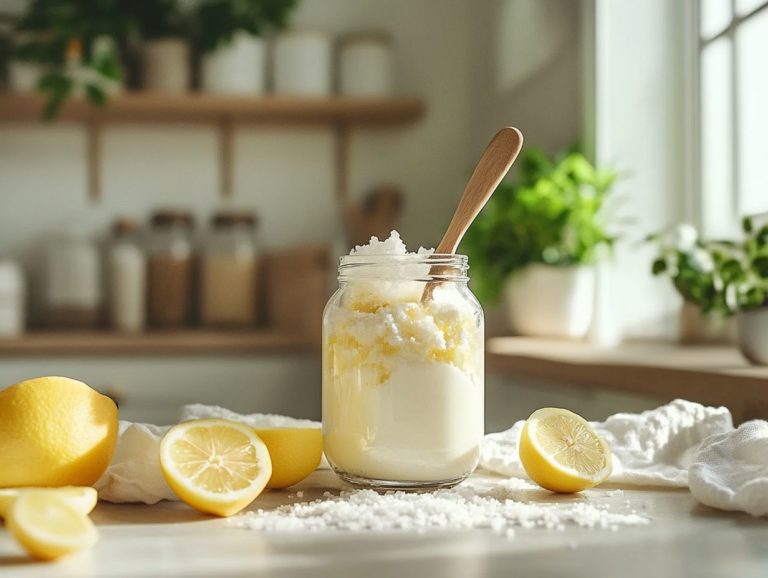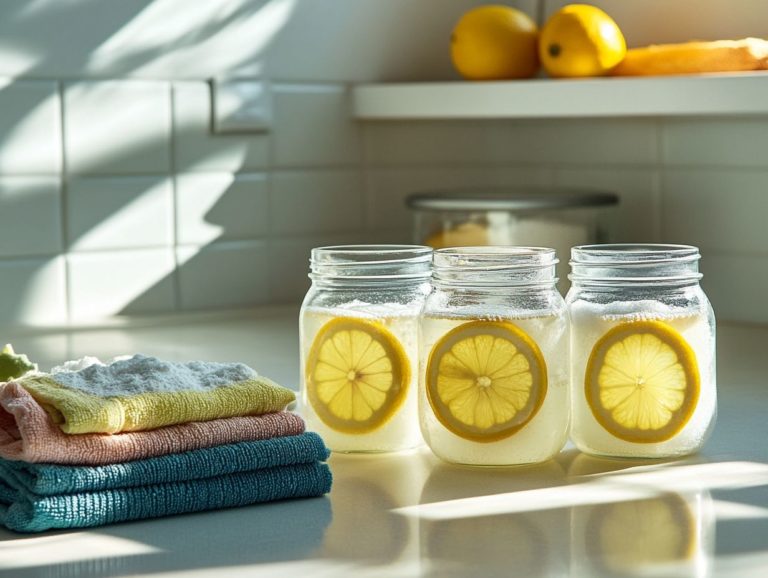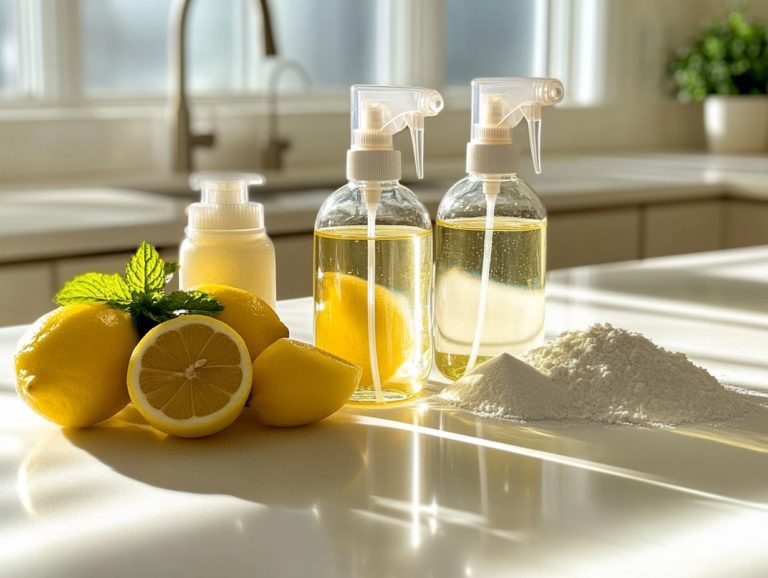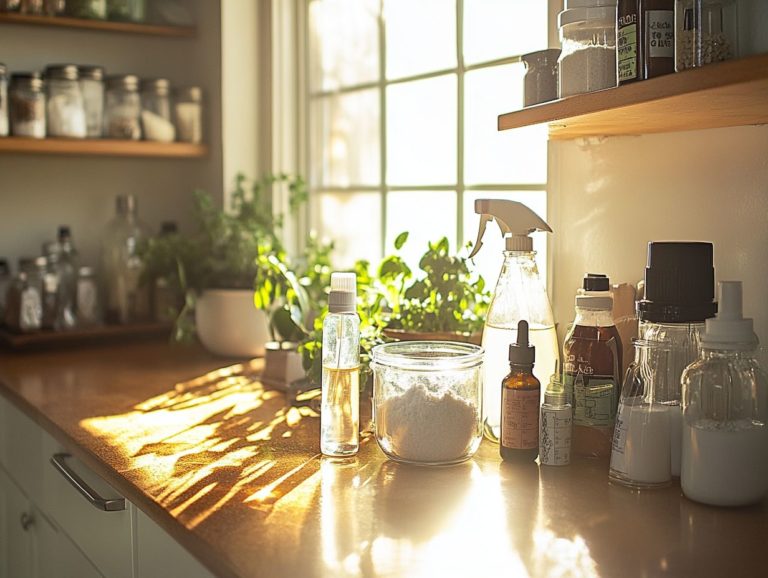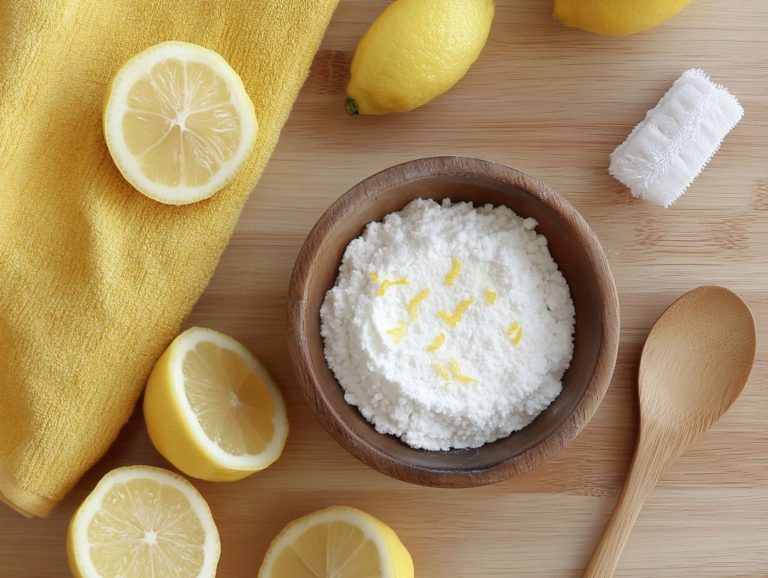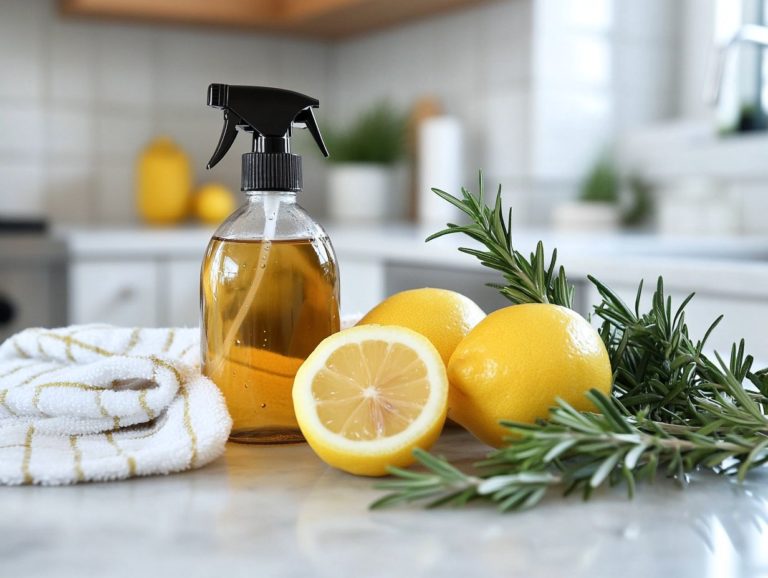5 Benefits of Using Homemade Cleaning Products
In a world that increasingly prioritizes health and sustainability, crafting your own natural cleaning products emerges as an enticing option for your household.
Homemade cleaners not only enhance your well-being but also promote environmental benefits and save you money. With the freedom to tailor your green cleaning solutions to your specific needs, you can steer clear of harmful chemicals while still achieving impressive results.
Dive into this article and discover how easy and rewarding it is to make your own safe cleaning products! This article explores the myriad advantages of homemade cleaning products, offers practical tips for creating them, and provides simple recipes to embark on your eco-friendly cleaning journey, enhancing indoor air quality and being safe for pets.
Contents
- Key Takeaways:
- 1. Keep Your Home Safe and Healthy!
- 2. Better for the Environment
- 3. Cost-Effective
- 4. Customizable for Specific Cleaning Needs
- 5. Reduces Exposure to Harsh Chemicals
- Why Should You Consider Making Your Own Cleaning Products?
- What Are Some Common Household Items That Can Be Used for Cleaning?
- How Can Homemade Cleaning Products Be as Effective as Store-Bought Ones?
- What Are Some Tips for Making and Storing Natural Cleaning Products?
- Are There Any Disadvantages to Using DIY Cleaning Products?
- What Are Some Recipes for DIY Cleaning Products?
- Frequently Asked Questions
- What are the benefits of using eco-friendly cleaning products?
- How do homemade cleaning products compare to store-bought ones?
- What ingredients are commonly used in natural cleaning products?
- Will using homemade cleaning products save me time?
- Are DIY cleaning products safe to use on all surfaces?
- Can homemade cleaning products be just as effective as store-bought ones?
Key Takeaways:
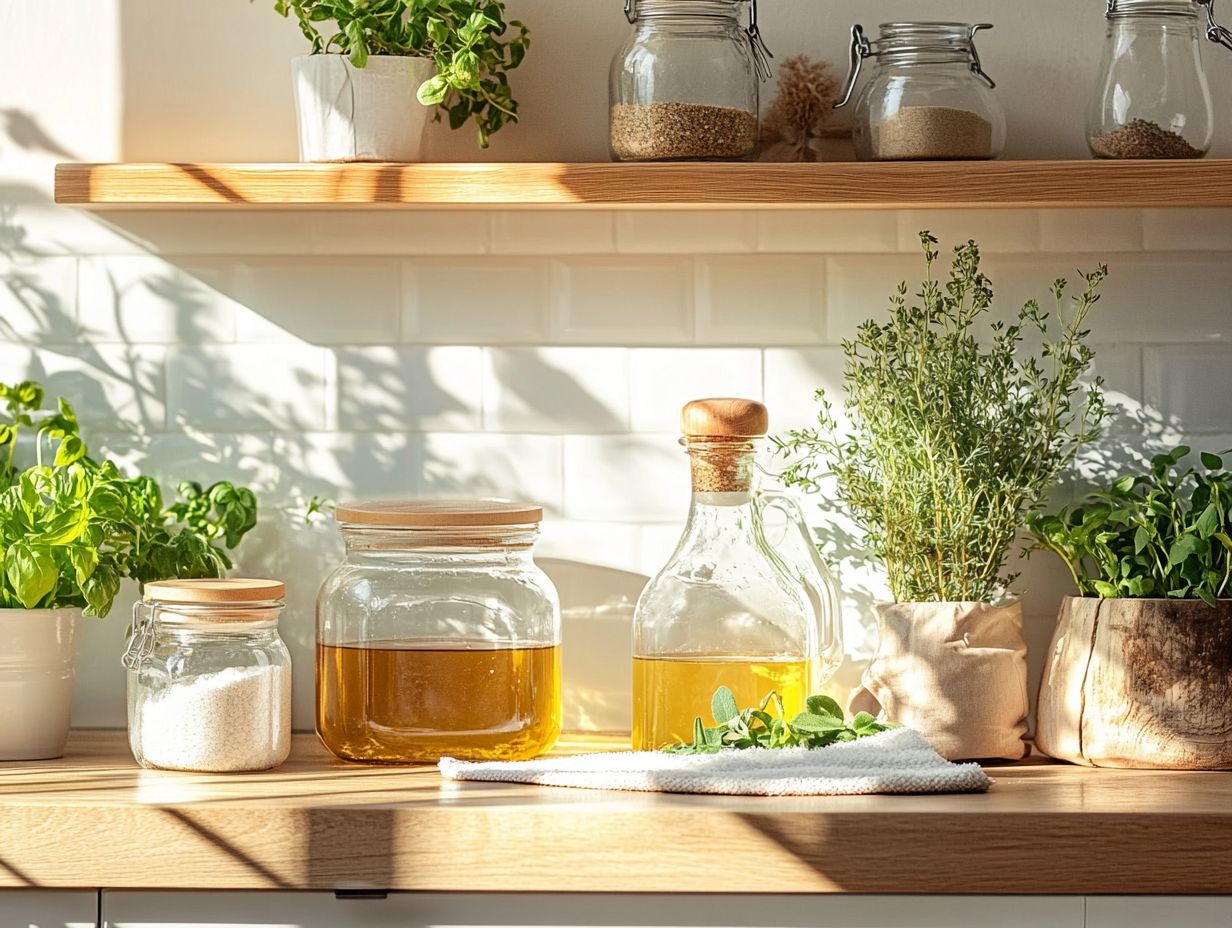
- Switching to homemade cleaning products can reduce your exposure to harmful chemicals, making them safer for your health and indoor air quality.
- Homemade cleaning products are better for the environment as they do not contain harmful ingredients that can pollute water and air, making them environmentally friendly.
- Save money with homemade cleaning products, which are often made from affordable ingredients you already have!
1. Keep Your Home Safe and Healthy!
Using natural cleaning products is crucial for maintaining a healthier home environment. By choosing these options, you significantly reduce your exposure to harmful chemicals that can compromise indoor air quality and pose health risks, particularly for families with pets or individuals with sensitive skin.
Research shows conventional cleaning agents release volatile organic compounds (VOCs). These are harmful gases that some cleaning products can release into the air, potentially leading to respiratory issues and other serious health concerns. In fact, reports suggest that up to 30% of the general population may suffer adverse health effects from these substances, highlighting the importance of making safer choices.
By opting for eco-friendly alternatives like those with organic ingredients, you minimize the risk of allergies and irritations. This choice helps protect both human health and the planet while creating a cleaner environment for everyone.
With a vast selection of natural options now available, transitioning to these safer products has never been more essential for enhancing your overall well-being at home, ensuring household safety and reducing toxic exposure.
2. Better for the Environment
Choosing eco-friendly cleaners is a vital step in reducing your environmental impact. These products often come in biodegradable packaging and are manufactured using ethical practices that prioritize sustainability and less clutter over harmful chemicals.
By opting for these alternatives, you not only minimize your contribution to plastic waste but also play a part in the transition toward a circular economy. Many eco-friendly brands are committed to using natural, non-toxic ingredients sourced from renewable resources, effectively breaking the cycle of environmental degradation caused by conventional cleaning agents.
These brands are gaining recognition for their commitment to sustainability. Take Seventh Generation, Puracy, and Method, for example; they utilize plant-based formulas and plant-based surfactants that not only rival traditional cleaners but are also gentler on the planet.
As awareness grows, choosing such products becomes an essential step toward ensuring a cleaner, healthier future for everyone. This reinforces the idea that even small changes in your consumer habits and eco-conscious choices can yield significant environmental benefits.
3. Cost-Effective
Opting for DIY cleaning solutions can be a savvy move. This approach boosts your cleaning efficiency. It also saves you money compared to expensive store-bought alternatives.
By utilizing everyday household ingredients, you can create effective solutions that serve multiple purposes. Take, for example, vinegar, baking soda, and lemon juice. These natural powerhouses are incredibly versatile, making them perfect for a range of cleaning tasks. Mixing vinegar with water creates a fantastic glass cleaner, while baking soda shines as a powerful deodorizer and scrub for those stubborn stains.
By choosing to concoct these solutions at home, you re minimizing waste and reducing exposure to potentially harmful chemicals. You re also spending just a fraction of what those mainstream cleaning products would set you back. These informed choices give you the power to maintain a clean and healthy home environment without straining your budget, contributing to a more sustainable lifestyle.
4. Customizable for Specific Cleaning Needs
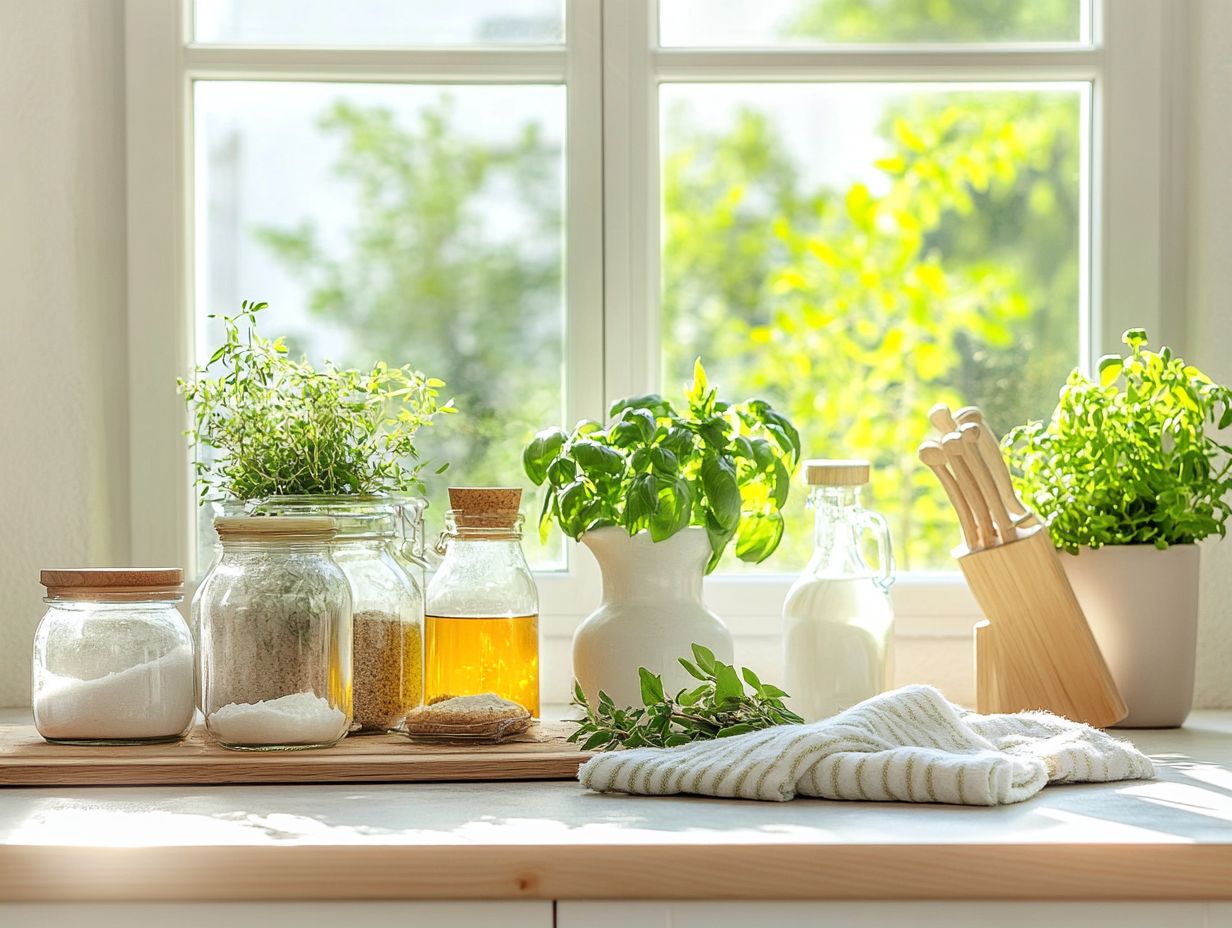
One of the greatest advantages of crafting your own cleaning products lies in the ability to tailor them precisely to your specific cleaning needs. This ensures that you have effective solutions designed for various surfaces and health concerns, including those related to sensitive skin and allergy-free products.
You can choose ingredients that align with your values, whether that be eco-friendliness or allergy considerations, ultimately nurturing a more personal approach to cleanliness. For instance, if you have respiratory issues, you might prefer a formulation free from harsh chemicals or overpowering fragrances.
Conversely, you may seek out natural antibacterial agents to elevate the effectiveness of your cleaning routine while avoiding harmful chemicals that can affect your health. The flexibility to adjust ingredient concentrations and combinations enhances cleaning efficiency and promotes safety, guaranteeing that your products are both powerful and gentle.
This approach creates a healthier indoor environment for you to enjoy, ensuring household safety and reducing environmental impact.
5. Reduces Exposure to Harsh Chemicals
By utilizing natural cleaning products, you significantly reduce your exposure to the harsh chemicals often found in traditional cleaning supplies. This choice not only protects your family from toxic exposure but also promotes a safer home environment and reduces household toxins.
Choosing products with chemical-free labels helps safeguard your family from potential health risks while also contributing to a cleaner planet. These eco-friendly options keep harmful effects at bay, serving as safer alternatives to conventional products.
Opting for cruelty-free products underscores your commitment to ethical ingredients that haven t been tested on animals, allowing you to align your values with your purchasing decisions. Embracing these alternatives fosters a healthier living space and supports sustainable practices.
By choosing natural products, you not only protect your family but also help create a cleaner world for future generations.
Why Should You Consider Making Your Own Cleaning Products?
Creating your own cleaning products gives you the power to take charge of the ingredients that fill your home. By choosing natural cleaning solutions, you not only achieve effective results but also embrace an eco-friendly lifestyle that fosters a healthier living environment and reduces your exposure to harmful chemicals and allergens.
This DIY approach enhances the safety of your home. It also offers the flexibility to tailor your cleaning solutions for specific needs, whether you’re battling tough stains or banishing stubborn odors.
With common household ingredients like vinegar, baking soda, and essential oils at your disposal, you can craft powerful cleaners without breaking the bank! For example, a simple mixture of vinegar and water becomes a stellar all-purpose cleaner, while a paste of baking soda works wonders on the grime that tends to accumulate in kitchens and bathrooms.
To ensure your DIY cleaning efforts are successful, remember to label your homemade solutions, perform patch tests on surfaces, and store them securely away from children and pets.
What Are Some Common Household Items That Can Be Used for Cleaning?
Many common household items can serve as highly effective cleaning agents. Examples include vinegar, baking soda, and ammonia.
When combined with essential oils, they create powerful DIY cleaning solutions perfectly tailored to your needs! For instance, vinegar isn t just a natural disinfectant; it s also exceptional at breaking down mineral deposits.
This makes it ideal for cleaning glass and countertops. Baking soda, on the other hand, works as a mild abrasive that can tackle tough stains, making it perfect for scrubbing sinks and bathtubs.
In terms of cutting through grease, ammonia shines as a great option for kitchen surfaces while minimizing chemical interactions. Incorporating essential oils like tea tree or lavender not only adds a delightful natural fragrance but also enhances the germ-fighting abilities of your cleaning formulas.
A simple mixture of vinegar and water can freshen up bathroom tiles. At the same time, a paste made of baking soda and water can restore the shine to your stainless steel appliances.
How Can Homemade Cleaning Products Be as Effective as Store-Bought Ones?
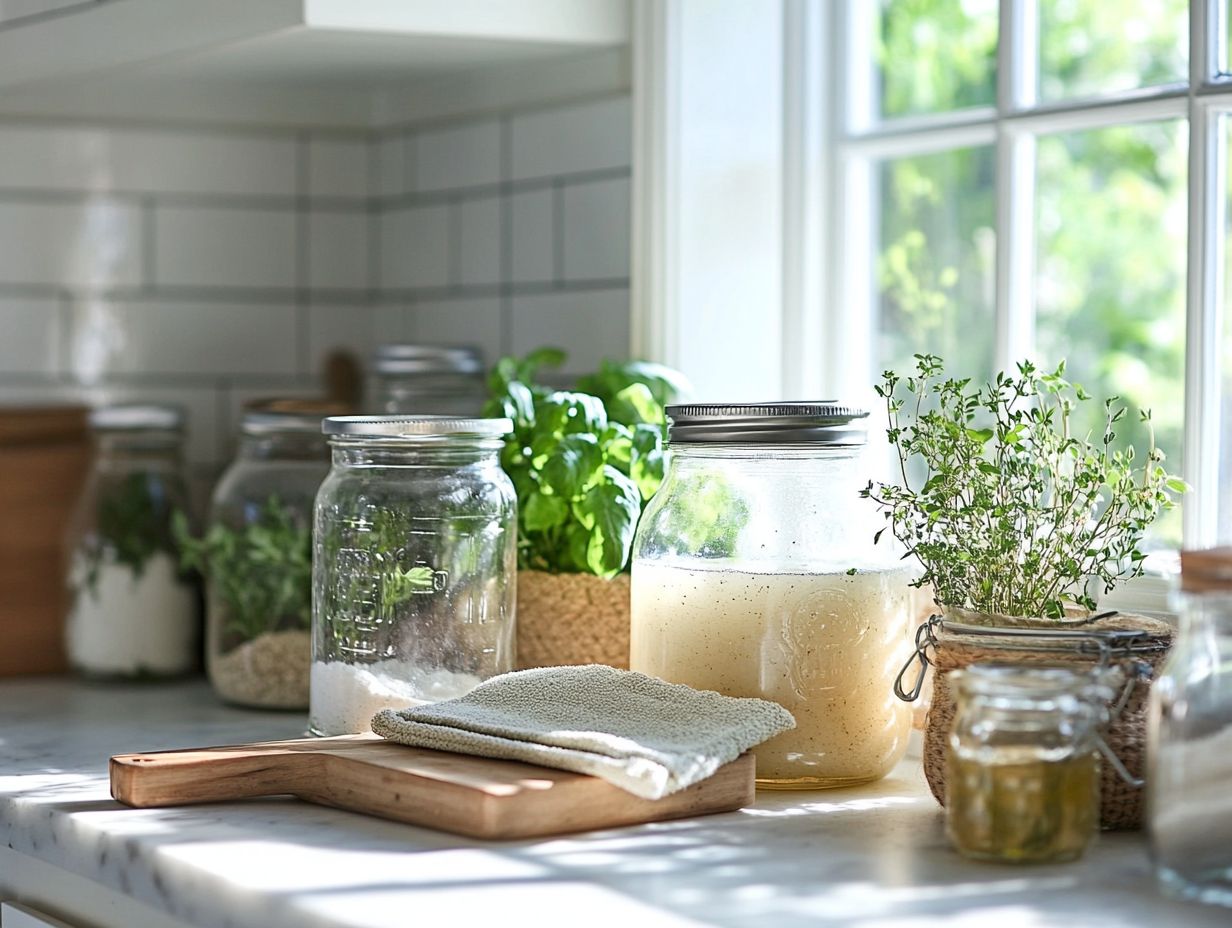
Homemade cleaning products can easily rival the effectiveness of store-bought options by utilizing the natural cleaning power of ingredients like vinegar and baking soda. These humble staples boast antibacterial properties that tackle dirt and grime without the risk of harmful chemical interactions and household toxins.
These components excel at breaking down stubborn stains while disinfecting surfaces. For example, a simple mixture of vinegar and water can efficiently banish soap scum in your bathroom, often outperforming many commercial cleaners laden with harmful chemicals.
Baking soda also acts as a gentle abrasive, ideal for scrubbing surfaces such as kitchen counters and sinks, delivering a powerful yet non-toxic alternative for your everyday cleaning needs. These eco-friendly cleaners can improve indoor air quality by minimizing toxic exposure!
The versatility of these natural ingredients is truly remarkable. You can craft effective solutions for specific challenges, whether it’s unclogging a drain or freshening up carpets. Embracing eco-friendly options is not just smart; it keeps your home safe and clean!
What Are Some Tips for Making and Storing Natural Cleaning Products?
Creating your own cleaning products is not just easy, it’s fun and rewarding! To ensure the longevity and effectiveness of your homemade cleaning products, follow specific guidelines for both making and storing them.
Consider using glass containers and biodegradable packaging, as they provide safe and eco-friendly storage options. Using organic ingredients can also enhance the safety and efficacy of your solutions.
Proper labeling is crucial for safety and organization. It helps you quickly identify the contents and prevents potential mishaps, especially in households with children or pets. As you create these products, always remember the pH of your ingredients; certain combinations could lead to harmful reactions.
Store your cleaning supplies in a cool, dark place to maintain their effectiveness and prevent degradation. Incorporating natural fragrances can make your homemade solutions more pleasant to use.
Choosing sustainable packaging not only reduces waste but also positively impacts environmental efforts. This approach supports eco-conscious practices while ensuring that your cleaning products remain safe and easily accessible for everyday use.
Opt for biodegradable products and reusable materials to further reduce your environmental impact.
Are There Any Disadvantages to Using DIY Cleaning Products?
While homemade cleaning products can offer numerous benefits, it s important to consider the potential downsides, such as inconsistent cleaning effectiveness and the risk of health issues from allergens or improper formulations.
Factors like chemical interactions and volatile organic compounds chemicals that can easily evaporate and may harm indoor air quality should be carefully considered.
One major concern is the unpredictability of results, which might leave surfaces not as clean or sanitized as you d hope. Many individuals may not realize how certain ingredients interact, potentially leading to undesirable or even harmful reactions.
Additionally, DIY solutions may lack the antibacterial properties found in some commercial options. To minimize these risks, conduct thorough research before whipping up any DIY solution.
Stick to reliable recipes from trusted sources to ensure that your formulations are safe for use. Check customer reviews and expert recommendations for valuable insights.
Test these homemade concoctions on less visible areas before applying them widely. This precaution helps you avoid unforeseen reactions or damage, especially in homes with sensitive skin or pets.
What Are Some Recipes for DIY Cleaning Products?
Making your own cleaning products at home can be simple and incredibly rewarding. With recipes that use natural ingredients like vinegar, baking soda, and essential oils, you can craft effective and eco-friendly cleaning solutions.
Brands like Puracy and Seventh Generation offer excellent inspiration for those venturing into DIY cleaning.
By choosing these homemade alternatives, you significantly reduce reliance on harsh chemicals often found in commercial cleaners. This choice contributes to a healthier home environment and helps decrease environmental pollution. For more insights, check out the benefits of homemade cleaning products.
If you re eager to start, consider this popular recipe for an all-purpose cleaner: mix one cup of distilled white vinegar, one cup of water, and a few drops of your favorite essential oil for a refreshing scent. This supports sustainable products and eco-conscious choices.
This mixture cuts through grease and eliminates odors on various surfaces, making it a versatile addition to any cleaning routine. Using such solutions saves you money and promotes sustainability, encouraging a shift toward greener living practices.
Brands like Simple Green and CLR Calcium, Lime, Rust Cleaner provide excellent commercial alternatives with similar eco-friendly benefits.
Frequently Asked Questions
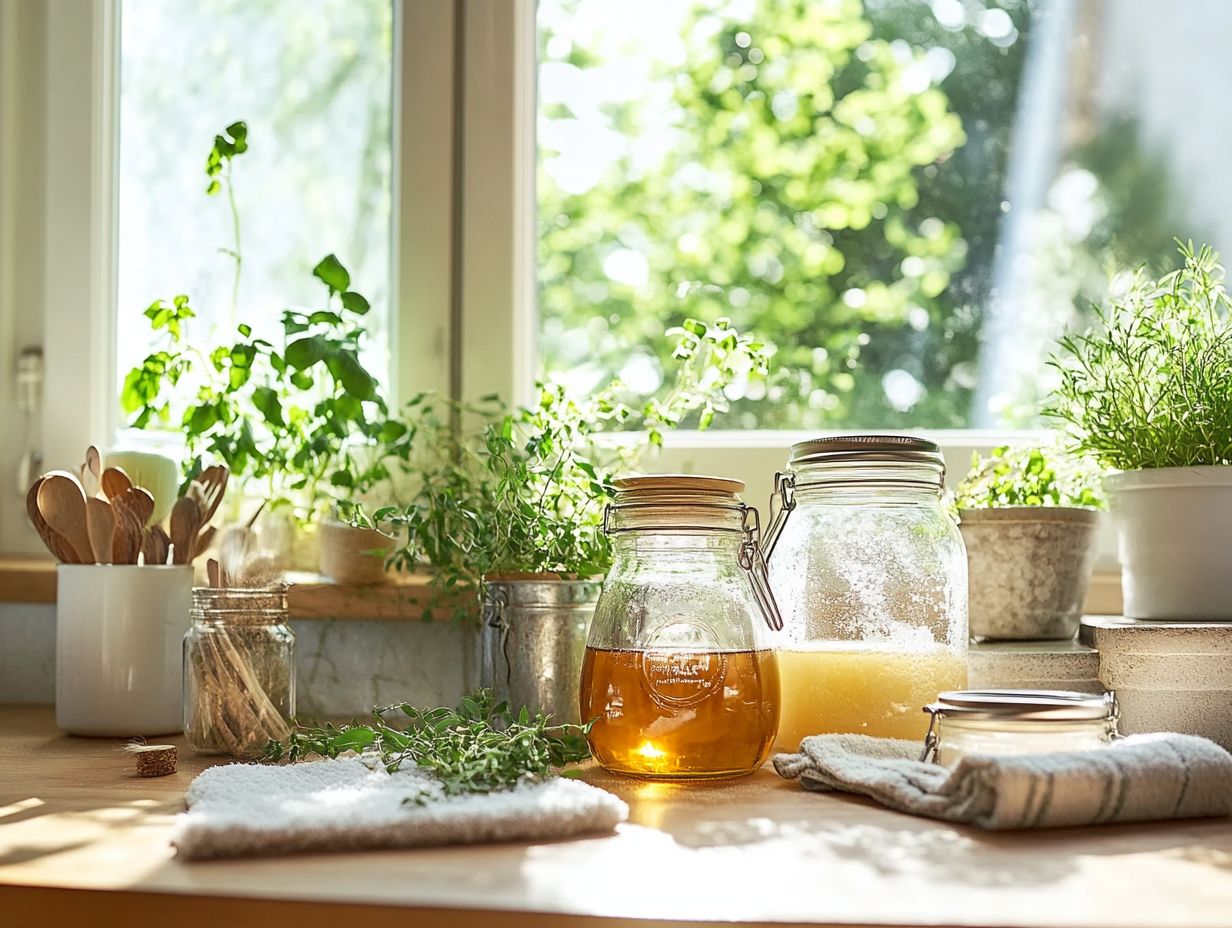
What are the benefits of using eco-friendly cleaning products?
1. Cost-effective: Homemade cleaning products are made with easily available and affordable ingredients. This can save you money in the long run compared to store-bought options. They also help reduce toxic exposure and household toxins.
2. Healthier alternative: Many store-bought cleaning products contain harsh chemicals that can be harmful to your health. Homemade cleaning products use natural ingredients that are safer for you and your family. They are also safe for pets and can be customized to be allergy-free.
3. Environmentally friendly: By using homemade cleaning products, you can lower your carbon footprint. These products do not contain the harmful chemicals often found in commercial options, which reduces your environmental impact and supports the guidelines of the Environmental Protection Agency, the government agency that protects human health and the environment.
4. Customizable: You can create your own homemade cleaning products using various ingredients and scents, allowing for personalization. This flexibility supports the benefits of using natural cleaning products and promotes safer alternatives.
5. Versatility: Homemade cleaning products can be used for many cleaning tasks, from surfaces to laundry. This makes them a versatile choice for your household cleaning needs. Opting for green cleaning solutions supports sustainable products and helps reduce harmful chemicals that can pollute the air.
How do homemade cleaning products compare to store-bought ones?
Some store-bought cleaning products might remove tough stains more effectively or have a stronger scent. However, homemade cleaning products can be just as effective, depending on the ingredients used. They are often free from endocrine disruptors and toxic chemicals, enhancing overall household safety.
What ingredients are commonly used in natural cleaning products?
Common ingredients in homemade cleaning products include vinegar, baking soda, lemon juice, essential oils, and castile soap. These ingredients are natural, non-toxic, and easily accessible. They offer cleaning efficacy and serve as healthier alternatives.
Will using homemade cleaning products save me time?
While making your own cleaning products may require a bit more time and effort upfront, it can save you time in the long run. You can customize and make larger batches at once. Start today, and see the difference in your cleaning routine! This process reduces plastic waste and promotes environmentally responsible practices.
Are DIY cleaning products safe to use on all surfaces?
It s important to do your research and test any homemade cleaning product on a small, inconspicuous area before applying it to larger surfaces. Some ingredients, like vinegar, may not be suitable for certain surfaces such as marble or granite. Checking for biodegradable packaging and cruelty-free products can also guide better choices.
Can homemade cleaning products be just as effective as store-bought ones?
Yes! Homemade cleaning products can be just as effective as store-bought ones, especially when using powerful ingredients like vinegar, baking soda, and lemon juice. However, some store-bought options may have added chemicals for enhanced strength, so it s essential to research and find the right homemade recipe for your cleaning needs. Brands like Attitude and Seventh Generation provide excellent eco-friendly cleaning alternatives.

